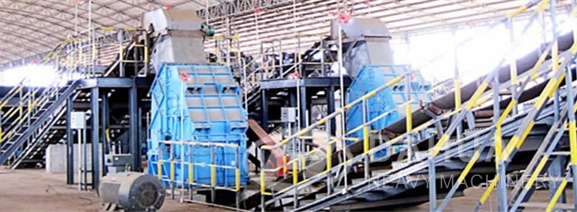Hammer crusher is mainly used for the medium and fine crushing for the soft and medium hardness materials, such as shale, chalk, gypsum, limestone, coal, lump of sodium carbonate, sulfate, clay, and kaolin, etc.
Hammer crusher mainly includes double rotor hammer crusher and single rotor hammer crusher. Crushing material requirement of double rotor crusher is: compressive strength < 200 kpa, mohs hardness < 4.5, permitted maximum moisture is 25-30%, permitted maximum clay content is 30%. Crushing material requirement of single rotor hammer crusher is: material moisture should not exceed 10%, clay content should be limited within 20%.

The advantages of hammer crusher
(1) Crush the material along the joint, bedding and other weak planes by using impact force, so it has high crushing efficiency, less consumption, high output, uniform product size, and less overgrinding.
(2) Large crushing ratio, usually is 10 to 15 with the maximum around 40, so we can simplify the crushing process, and reduce the infrastructure investment.
(3) Simple structure, low cost, convenient operation and maintenance.
(4) Selective crushing, that is to say, the material with large density becomes small particle size after crushing, and vice versa.
(5) Less weight with none obvious vibration, so the machine does not need heavy foundation.
The disadvantage of hammer crusher
Hammer head wears fast, the more hardness the materials, the more quick wear for the hammer head, which is not suitable for crushing hard materials and not suitable for crushing viscous material whose moisture content is more than 9% or make article screen plug easily, thus can decrease productivity and cause equipment accident.

